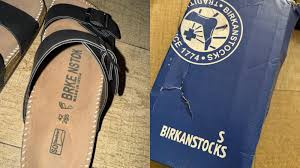Crackdown against Birkenstock ‘fakes’: Delhi HC orders factory inspections in India after footwear brand files lawsuit

The Delhi High Court has taken firm action after Birkenstock, the German footwear brand, filed a lawsuit against counterfeiters in India. The court ordered factory inspections and product seizures to curb the widespread sale of fake Birkenstock products.
Birkenstock Targets Growing Counterfeit Market in India
Birkenstock’s popularity has soared in India. However, with its rising demand, fake versions of its iconic sandals have flooded the market. These counterfeits closely mimic original designs and packaging, making them hard to spot.
In May 2025, Birkenstock filed a trademark infringement suit. The brand targeted four footwear traders, four factories, and two unnamed individuals. Its internal investigation had revealed that fake products were being produced in Agra and distributed across India and beyond.
Delhi High Court Responds with Strong Measures
Justice Saurabh Banerjee of the Delhi High Court responded promptly. On May 26, he appointed ten local lawyers as court commissioners to lead surprise factory inspections. These legal representatives were empowered to seize, pack, and seal fake goods found during the inspections.
Photos submitted to the court showed sandals and boxes bearing Birkenstock’s branding. The visual similarities between genuine and fake products were striking. Justice Banerjee noted that ordinary buyers could easily mistake the fakes for the real ones.
Factory Raids in Agra and Delhi
Acting on the court’s orders, inspection teams visited several factories in Agra and New Delhi. These sites were reportedly involved in manufacturing and packaging counterfeit Birkenstocks. The teams seized infringing products and submitted detailed reports to the court.
The court has scheduled the next hearing for October 6, 2025. Further legal action, including penalties or injunctions, may follow based on the inspection reports.
Why Counterfeit Products Are a Big Problem
Fake footwear doesn’t just hurt brands—it also deceives customers. Genuine Birkenstock products offer orthopedic support and durable materials. Counterfeits often fall short on quality and may cause discomfort or injury.
The counterfeit industry also causes economic damage. It leads to tax losses for the government, harms genuine manufacturers, and often involves exploitative labor practices.
A Wider Trend Among Global Brands
Birkenstock isn’t alone in fighting fakes in India. Other global brands like Crocs have also launched legal campaigns. Crocs recently revived a nine-year-old infringement case and got the court’s approval to act against fake products.
Luxury brands like Prada have also faced backlash. Prada showcased sandals resembling traditional Indian designs without proper attribution. This raised questions about design plagiarism and cultural appropriation.
As India becomes a key market for global fashion, brands are now more protective of their trademarks and designs.
Birkenstock’s Legal Team and Court Strategy
Birkenstock’s legal team, led by Delhi-based law firm Lall and Sethi, took a discreet approach. They sought ex-parte relief—legal action taken without informing the accused. This ensured the inspections happened before any factory could remove evidence.
Commissioners recorded the findings with photographs and documents. The operations remained confidential, and the court sealed many details to protect the integrity of the case.
The legal team hasn’t released a public statement yet, citing the ongoing nature of the case.
Legal Experts Support Court’s Action
Intellectual property lawyers have praised the Delhi High Court’s swift action. According to one legal expert, “Factory inspections are a strong message to counterfeiters. It tells them that brand owners are watching, and courts are backing them.”
The court’s support signals that Indian law is evolving to match international standards in brand protection. It’s especially important as India aims to attract more global companies.
How Consumers Can Stay Safe
Experts advise buyers to be cautious while shopping online or in local markets. Consumers should buy Birkenstock products only from authorized retailers. Verifying the seller’s credibility and checking for product details, like footbed markings and box logos, can help.
Brand websites and customer service teams can also confirm whether a product is genuine.
What Happens Next?
The October hearing will likely decide the next phase. Birkenstock may ask for a permanent injunction against the accused factories and demand financial damages.
The company also hopes the crackdown will act as a deterrent. If successful, other brands might adopt similar legal strategies to protect their products.
Final Thoughts
The Delhi High Court’s order marks a turning point in India’s fight against counterfeit goods. It shows the legal system’s growing readiness to support international brands and protect consumers.
For Birkenstock, this is more than a legal win. It’s a step toward preserving its identity and ensuring Indian customers enjoy genuine, high-quality footwear.






